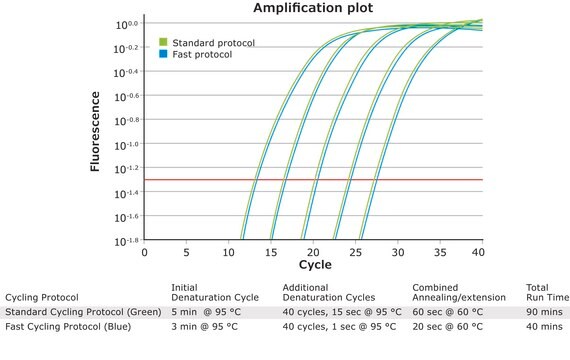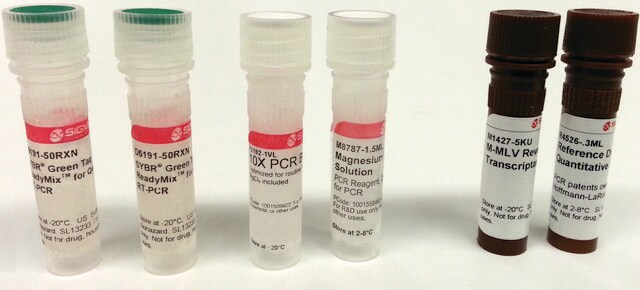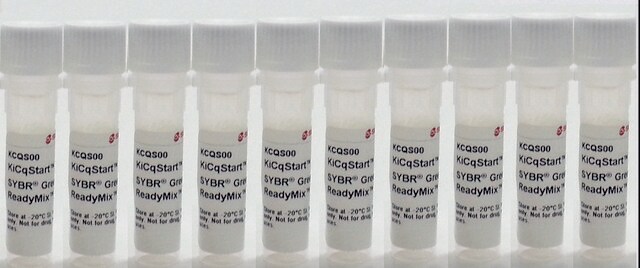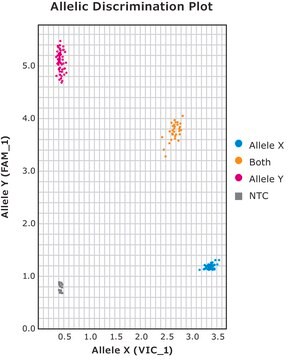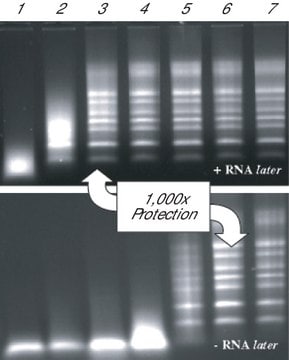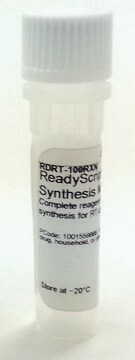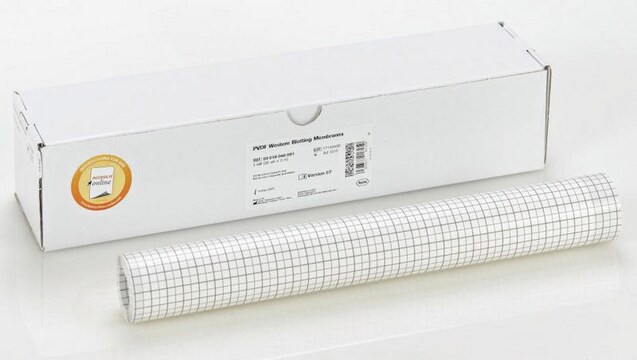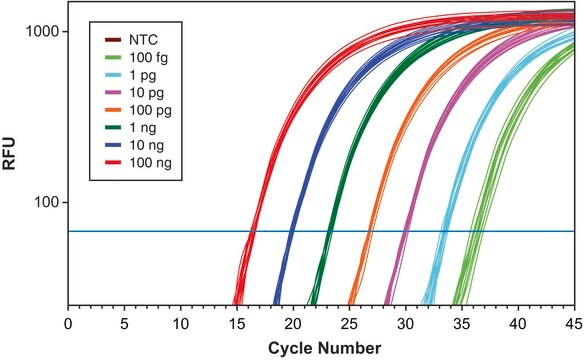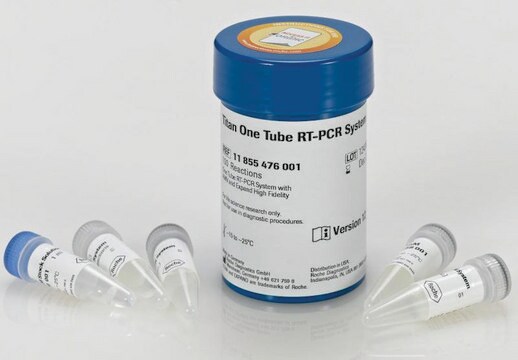SF1UKB
Roche
KAPA SYBR® FAST One-Step
suitable for RT-PCR, 2 ×, Universal
Sinonimo/i:
SYBR, qPCR
About This Item
Prodotti consigliati
Livello qualitativo
impiego
sufficient for 100 reactions
sufficient for 1000 reactions
sufficient for 500 reactions
Durata
≤6 mo.
Caratteristiche
dNTPs included: no
hotstart: no
Confezionamento
kit of 1 mL (100 x 20 μL rxn; KK4650)
kit of 10 mL (1000 x 20 μL rxn; KK4652)
kit of 5 mL (500 x 20 μL rxn; KK4651)
Produttore/marchio commerciale
Roche
Concentrazione
2 ×
tecniche
RT-PCR: suitable
qPCR: suitable
input
purified DNA
Compatibilità
for use with Agilent Mx3000P
for use with Agilent Mx3005P
for use with Agilent Mx4000
for use with Applied Biosystems® 5700
for use with Applied Biosystems® 7000
for use with Applied Biosystems® 7300
for use with Applied Biosystems® 7500
for use with Applied Biosystems® 7700
for use with Applied Biosystems® 7900HT
for use with Applied Biosystems® ViiA 7
for use with QuantStudio™
for use with StepOne™
for use with StepOnePlus™
Metodo di rivelazione
SYBR® Green
Temperatura di conservazione
−20°C
Cerchi prodotti simili? Visita Guida al confronto tra prodotti
Descrizione generale
KAPA SYBR FAST One-Step qRT-PCR Kits contain M-MuLV reverse transcriptase, RNase inhibitor, and a novel DNA polymerase evolved via directed evolution.
Applicazioni
- Gene expression analysis
- Low-copy gene detection
- Microarray validationmiRNA research
- Gene knockdown validation
- Real-time quantitative reverse transcription-PCR (qRT-PCR)
- RNAi and miRNA research
Caratteristiche e vantaggi
- Consistently higher amplification efficiencies for accurate qPCR.
- Higher fluorescence, earlier Cq values and improved reaction efficiencies.
Amplify across a broad range of target lengths
- Robust performance independent of amplicon size.
- Improve sensitivity and reproducibility
- Accurate interrogation across a wide range of RNA template concentrations.
Quick Notes:
- This kit contains wild-type M-MuLV and an engineered enzyme optimized for qPCR using SYBR Green I dye chemistry.
- The 2X master mix contains a proprietary buffer. Together with the novel enzyme, this improves amplification efficiency of both GC- and AT-rich targets.
- Use only gene-specific primers for one-step qRT-PCR.
- Optimal cDNA synthesis is achieved at 42°C for 5 min.
- 3 min at 95°C is sufficient for RT inactivation and DNA polymerase activation.
- For 3-step cycling, use 20 sec for primer annealing and 1 sec for extension/data acquisition at 72°C.
- Do not exceed 25 μL reaction volumes.
Qualità
Nota sulla preparazione
The SYBR Green I dye contained in the KAPA SYBR FAST qPCR Master Mix (2X) and ROX/fluorescein dyes (depending on kit configuration) are light sensitive. Exposure to direct light for an extended period of time will result in loss of fluorescent signal intensity.
KAPA SYBR FAST qPCR Master Mix (2X) is stable through 30 freeze-thaw cycles. Ensure that all reagents are stored protected from light at -20°C when not in use. When protected from light, reagents are stable in the dark at 4°C for at least one week and may be stored at this temperature for short-term use provided that they do not become contaminated with microbes and/or nucleases.
Altre note
Note legali
Solo come componenti del kit
- KAPA RT Mix
- dUTP
- KAPA SYBR® FAST DNA Polymerase
- reaction buffer
- dNTPs
- SYBR® Green I dye
- MgCl2 2.5 mM
Avvertenze
Warning
Indicazioni di pericolo
Consigli di prudenza
Classi di pericolo
STOT SE 2
Codice della classe di stoccaggio
12 - Non Combustible Liquids
Classe di pericolosità dell'acqua (WGK)
WGK 1
Punto d’infiammabilità (°F)
does not flash
Punto d’infiammabilità (°C)
does not flash
Certificati d'analisi (COA)
Cerca il Certificati d'analisi (COA) digitando il numero di lotto/batch corrispondente. I numeri di lotto o di batch sono stampati sull'etichetta dei prodotti dopo la parola ‘Lotto’ o ‘Batch’.
Possiedi già questo prodotto?
I documenti relativi ai prodotti acquistati recentemente sono disponibili nell’Archivio dei documenti.
I clienti hanno visto anche
Articoli
An overview of directed evolution and the methods for generating proteins with optimized or entirely new functions.
Il team dei nostri ricercatori vanta grande esperienza in tutte le aree della ricerca quali Life Science, scienza dei materiali, sintesi chimica, cromatografia, discipline analitiche, ecc..
Contatta l'Assistenza Tecnica.